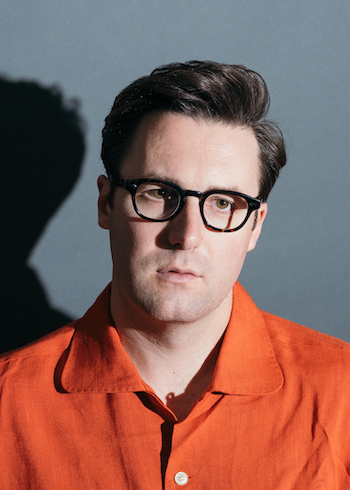Music Preview: Soul Man Cometh — Nick Waterhouse
By Jason M. Rubin
The music Nick Waterhouse performs (almost all of which he writes) is consistently retro—not to mention relentlessly danceable and fun.

Nick Waterhouse — he doesn’t think he plays soul music. Photo: Zach Lewis
How long does a soul revival have to be sustained before it’s no longer a revival but back firmly in the mainstream of popular music? Launched, perhaps, by the emergence of white female belters like Amy Winehouse, Joan Osborne, Adele, and Joss Stone, the gauntlet has been taken up in recent years by white dudes like Mayer Hawthorne and his lookalike, 33-year-old singer-songwriter-guitarist Nick Waterhouse (the nerdy Buddy Holly look has, of course, been well-represented by Elvis Costello and Marshall Crenshaw in the interim). But Waterhouse, who will front a seven-piece band including two horns at Brighton Music Hall next Monday, May 13, at 8 p.m., doesn’t embrace the “blue-eyed soul” label.
“My influences are black American music, but I don’t think I play soul music,” he says. “That’s very much a marketing thing. When soul was first happening in the 1950s and ’60s, it was a social phenomenon within the black community. It’s dangerous if you think you’re going to replicate something that’s so tied into things like the civil rights movement.”
While Waterhouse laments the “overcategorization” of music today, there’s no question that his music harks back to the R&B and soul music of decades gone by. With funky bass, swinging drums, horns (including baritone honks), female background singers, and his own assured lead vocals and guitar, the music he performs (almost all of which he writes) is consistently retro—not to mention relentlessly danceable and fun.
Unlike his prior albums, which he produced himself (he also produced the Allah-Lahs), Whitehouse’s new album—his fourth, released last March—was co-produced by Paul Butler (Michael Kiwanuka). In keeping with the retro concept, the sound is refreshingly lo-fi. I asked him about that, and the experience of working with an outside producer.
“Paul and I share a sonic vision in our work,” he says. “He gets a very spatial, organic-sounding vibe. We met through friends and decided in two hours that we needed to work together. I welcome having another set of ears. Producing yourself is like being an actor in a film you’re directing: you tend to be your own blind spot. Paul was able to draw a stronger performance out of me.
“Fidelity is a subjective thing, in my opinion,” Waterhouse continues. “I feel like the sonic landscape has been flattened over the years, like there’s only one way to do things. Look at a painter like Gauguin; you could say his technique is childlike or primitive. But maybe that’s the point. The concept of fidelity is such a loose thing these days, when you have people listening to music off their phones.”
Aside from being a fan of the music he has so deeply internalized, California-born-and-raised Waterhouse credits the writings of Boston-based writer Peter Guralnick about Southern white soul genius Dan Penn with inspiring his approach to music-making. “Reading about Penn, I was struck by him talking about his feeling of displacement in time and space, driving around in his car and picturing himself as Bobby Blue Bland when writing songs. That’s about something bigger; it’s a bunch of forces acting on you. When you’re playing the music, you conjure it. It’s not a static or a passive thing.”
His first recording under his own name was a single, “Some Place,” that Waterhouse cut and self-distributed in 2010. His first album, Time’s All Gone, was released in 2012 on Innovative Leisure Records. Later that year he was a featured guest on Live From Daryl’s House. Two more albums followed; the latter, 2016’s Never Twice, featured the catchy tune “Katchi,” which, in a remixed version, hit #1 in France.
His eponymous new album, which was released on March 8, is both a continuation of his past work and a fresh beginning. “The new one is self-titled because I think it’s a good place for people to start with me,” he explains. “I feel strongest about the lyrics, I think it’s the best representation of what I do.”

Nick Waterhouse at Heineken Jazzaldia, 2016. Photo: Wiki Commons.
To these ears, the album comprises a set of songs that push forward chronologically from the black soul and R&B sounds of his earlier albums, to the first generations of white performers who took that inspiration and put their own stamp on it. The noir-ish opener “By Heart” (“You know and I know/That maybe means never”) is smoky jazz over a pop beat, while the next song, “Song For Winners”, recalls the gravel and grime of the Animals and Them with its faux bravado: “I tried as a man/I’ll tell you what I hear/Oh, I hear no fearlessness, only fear.” Crossing the pond, the backing track for “I Feel an Urge Coming On” has a Ventures feel.
On top of all that, though, is Waterhouse’s own voice. In the lyrics to “Undedicated” he is facing a breakup by being at turns confessional (“Thin skinned, so I’ve gotta be medicated/Undisciplined and undedicated”) and cruel (“Think back to all the things you hated/And when this goes out to you/This song will be undedicated”). And in “Thought & Act” he is batting away temptation by repeating the refrain “I’m with you” over and over—until, perhaps, he begins to believe it.
“I write a lot of my songs independent of each other,” he says. “I grew up listening to 45s, so I’m a singles-oriented person who puts out albums. That gives me the chance to try out different aspects of things.”
Waterhouse’s U.S. tour (which follows a European leg) comes to an end later this month, then he’ll be hitting the road again in the fall.
Jason M. Rubin has been a professional writer for more than 33 years, the last 18 of which as senior creative associate at Libretto Inc., a Boston-based strategic communications agency where he has won awards for his copywriting. He has written for The Arts Fuse since 2012. Jason’s first novel, The Grave & The Gay, based on a 17th-century English folk ballad, was published in September 2012. His current book, Ancient Tales Newly Told, released in March 2019, combines in a single volume an updated version of his first novel with a new work of historical fiction, King of Kings, depicting the meeting of King Solomon and the Queen of Sheba. Jason holds a BA in Journalism from the University of Massachusetts Amherst.
